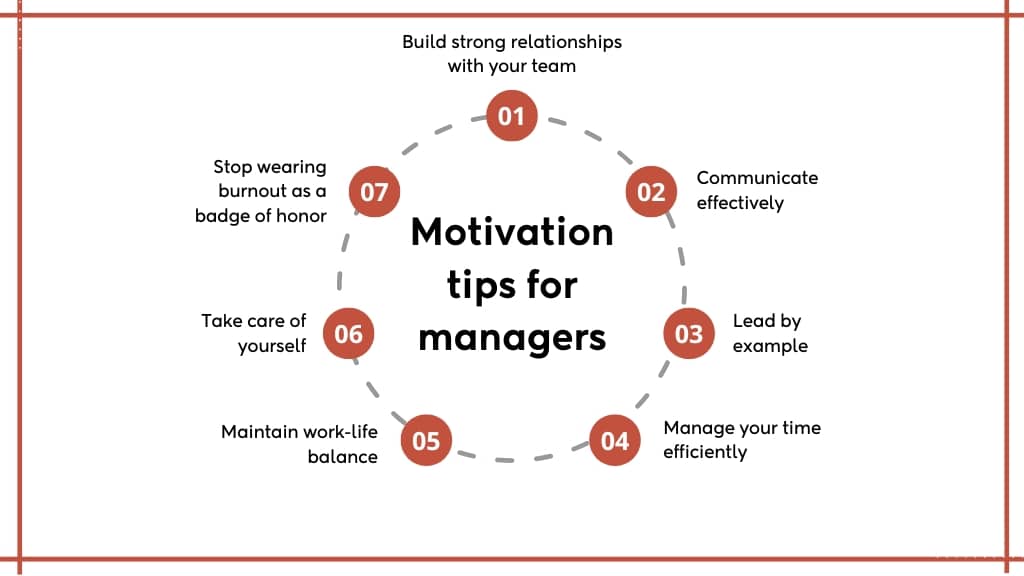Introduction
Stuck in a Rut? Here’s how to lead with energy again.
Let’s face it: managing a team is no walk in the park. It’s easy for a manager to get stuck in a routine, overwhelmed by constant demands, or simply burnt out from the pressures of leadership. But don’t worry – there are ways to get back on track.
In this article, you will explore the common reasons why motivation can slip away, like burnout, job dissatisfaction, and external stressors. You will also learn seven practical tips that can help you revive your energy, refocus your goals, and recharge your passion for leadership.
So, let’s get you back to leading with enthusiasm and a renewed sense of purpose.
Find the reasons: Why are you unmotivated?
Every manager has days when motivation feels out of reach. It’s not only you! Sometimes, the reasons can be as obvious as an overwhelming workload or as subtle as feeling stuck in a routine.
Before you can regain your energy, it’s important to pause and ask yourself – “What’s holding me back?”
Here are some common reasons behind low motivation:
- Burnout
Back-to-back meetings, tight deadlines, and the constant pressure to make the decisions can leave you mentally and physically exhausted. Burnout doesn’t happen overnight, it gradually builds up when you’re always running on empty.
Think of burnout as your body and mind’s way of signaling that something needs to change. Without addressing it, it can be hard for you to find any energy to lead effectively. Prioritizing rest and recovery isn’t a luxury, it’s a necessity.
- Job dissatisfaction
Have you been feeling disconnected from your role, team, or even your goals lately? Perhaps you’re stuck in routines that no longer excite you.
When you lose passion for your work and it starts to feel meaningless, it’s natural for your motivation to decline.
Read more: Revealed! The Happy Secret to Better Work
- Lack of challenge
As a manager, you’re used to solving problems and setting goals. But what happens when your tasks become too predictable?
If your work feels repetitive or too easy, you may get stuck in a comfort zone. Without fresh challenges, you can get bored, uninspired, or even complacent.
- External stressors
Personal issues, worries, financial concerns, health problems, or even global events can weigh heavily on your mind and impact your mental energy. You need to keep in mind that you’re a human, too.
These external pressures don’t just disappear when you walk into the office, they follow you, making it more difficult for you to focus or stay motivated.
Demotivation can arise from any underlying issues that we might overlook. So, take a step back and assess the root cause of your low drive. Are there any recent challenges, changes, or unexpected stressors that have thrown you off balance?
Sometimes, simply acknowledging what’s bothering you can bring clarity to your problems, making it easy to find actionable solutions to reignite your passion and focus.
7 Practical tips to boost motivation
Motivation is not only about working harder, you need to do smart work. By focusing on the right habits, you can keep yourself inspired while also lifting your team’s spirits.
Let’s explore seven practical tips that can help you revive your energy, refocus your priorities, and recharge your passion for increased productivity.

1. Build strong relationships with your team
“Teamwork makes the dream work.” You’ve probably heard this catchy phrase a hundred times, but have you ever paused to reflect on what makes it true?
When you take the time to connect with your team, you create an environment where everyone believes in each other’s potential. Everyone supports each other through challenges and celebrates milestones together.
As a manager, fostering trust and open communication will motivate your team. And, when your team feels motivated, you become motivated as well, and together you can achieve shared goals. Motivation flourishes in relationships where everyone feels valued and united.
2. Communicate effectively
As a manager, your words have the power to shape things for your team and for yourself. The way you communicate dictates your mindset and motivation.
For example, during a discussion meeting, a manager told their team members, “Just follow the process,” in a bid to save time. It was not a word of discouragement, but it had that effect. The lesson learned is what one says matters. It’s a reminder that words can go a long way in shaping conversations and how team members feel.
Effective communication will not only help you lead but recharge your own energy and focus. By choosing words that inspire and encourage you, you will boost your motivation and set a positive tone for the day ahead.
A communication tool like ProofHub can help you incorporate open communication within your team. These tools provide a centralized platform where all team members can share updates, store and share documents, get feedback, and work collaboratively without the hassle of using multiple tools. It makes sure that everyone on your team remains aligned and stays on the same page.
3. Lead by example
The desire to motivate oneself has a strong correlation with motivating fellow team members. Therefore, one should lead by example, just as they might motivate their team to work diligently and remain energetic in their tasks.
It makes everyone around you feel good when you show passion, commitment, and resilience. Take time to reflect on your own challenges and be vulnerable. You can share your experiences with your team to show them it’s okay to struggle and grow.
It’s not about leading others, but it’s about being an example, showing others that you too are willing to grow and improve. You’ll inspire motivation in yourself and your team.
4. Manage your time efficiently
Time is one of your most precious assets, and yet, it’s probably the hardest thing to manage as a manager. Saying “yes” to every request may seem like an opportunity, but it quickly leads to overwhelm and burnout.
You might find yourself agreeing for fear of conflict or seeming to cooperate, but it can move your priorities to the side. You could instead use your time well by establishing boundaries and learning how to say “no” at times and do only what’s important.
By respecting your own time, you’ll be able to recharge and refocus, which will make you at your best for both yourself and your team.
5. Maintain work-life balance
It’s easy to get caught up in the whirlwind of work, especially for managers. But maintaining a healthy work-life balance is crucial for your well-being.
Take, for example, a working parent who juggles early mornings, school runs, and tight work deadlines. The days are long and filled with constant to-dos, yet you don’t need to do everything perfectly, be flexible and adapt.
Managers, like parents, often push themselves hard. However, showing up with dedication at both work and home can make you more resilient. Balance is all about strength, flexibility, and being present, even on the toughest days.
Read more: Strategies for maintaining work-life balance in the workplace
6. Take care of yourself
A manager can easily get caught up in the hustle – meetings, deadlines, and endless tasks. But when was the last time you asked yourself, “How am I really doing?”
It’s important to check in with yourself regularly. Without taking a moment to recharge, you risk running on empty, and that affects your ability to lead effectively.
Find small yet meaningful ways to refill your energy. You can take a walk, spend quality time with loved ones, or enjoy a quiet moment with a book. Just keep in mind that you can’t pour from an empty cup. So, take the time to repair yourself, recharge, refocus, and come back stronger.
Read more: 9 Effective tips on how to protect your energy
7. Stop wearing burnout as a badge of honor
As a manager, you can easily fall into the trap of wearing burnout as a badge of honor. But pushing oneself to the brink isn’t helping anyone, especially not your team.
When you’re constantly exhausted, you can’t think properly, hence making bad decisions. Plus, your leadership will just be a mess. Prioritizing rest isn’t just about self-care, it’s a strategy for effective leadership. Thus recharging your self-time allows creativity, good focusing, and being energized toward leading clearly.
Share with your team that it’s okay to take a step back and set boundaries. Great leaders inspire by taking care of themselves first, so prioritize rest, and see your productivity soar.
Conclusion
“The only way to do great work is to love what you do.” – Steve Jobs
When you enjoy the work that you do and feel passionate about your goals, motivation simply flows. Motivation is something important in the process of managing a successful team.
By recognizing common energy leeches that leave you feeling drained and employing some of the tips laid out in this article, you can reignite the spark within you, help refocus your thoughts, and recharge.
Remember, self-care is not selfish, it is the only way to succeed sustainably. So, make sure to prioritize your well-being, celebrate your achievements, and build a positive and supportive environment for yourself and your team.




























No Comments